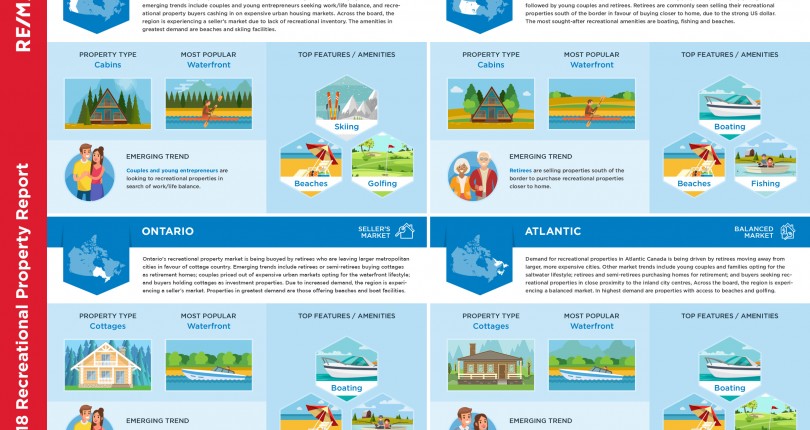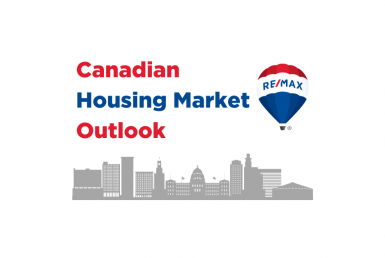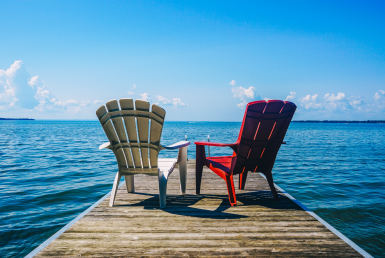2018 Recreational Property Report

BRITISH COLUMBIA
The recreational property market in British Columbia is being driven primarily by retirees. Other emerging trends include couples and young entrepreneurs seeking work/life balance, and recreational property buyers cashing in on expensive urban housing markets. Across the board, the region is experiencing a seller’s market due to lack of recreational inventory. The amenities in greatest demand are beaches and skiing facilities.
Retirees Drive Canada’s Recreational Property Market
RETIREES AND BABY BOOMERS CAPITALIZE ON HIGH-VALUE PRINCIPAL RESIDENCES TO ENTER ACTIVE RETIREMENT AT RECREATIONAL PROPERTIES, BLURRING THE LINE BETWEEN RECREATIONAL AND RESIDENTIAL.
A recent survey of RE/MAX brokers and agents found that in 91 per cent of popular Canadian recreational property markets examined, retirees were the key factor driving activity. This includes established recreational regions such as Prince Edward County and Comox Valley. This is in stark contrast to last year’s findings, when retirees were a dominant driving force in only 55 per cent of markets examined.
The survey found that in British Columbia, Ontario and Atlantic Canada, more retirees and soon-to-be retirees are purchasing recreational properties outside of urban centres for use as retirement homes, increasingly blurring the line between recreational and residential properties.
- Retirees are fueling demand: 91 per cent of regions surveyed reported that retirees drive demand for recreational properties
- One in three survey respondents (33 per cent) say that they own or want to own a recreational property for investment purposes
- Buyers are increasingly renting in urban centres such as Toronto and Vancouver while purchasing recreational properties
- Other than affordable purchase price, waterfront rated as the most important feature to Canadians when considering spending time at a cottage or cabin, beating out reasonable maintenance costs
“Last year, we found that Baby Boomers and retirees were increasingly selling their homes in urban centres like Toronto and Vancouver,” says Elton Ash, Regional Executive Vice President, RE/MAX of Western Canada. “It’s clear that many put the equity they received from those sales into the purchase of a recreational property with the intention to retire in comfort and away from the city.”
Many of these individuals are engaging in more active forms of retirement, choosing to maintain physical fitness and emotional fulfillment by pursuing passion projects and leading lifestyles that involve farming, hiking and maintaining vineyards. This is particularly the case in regions such as South Okanagan, Wasaga Beach and Rideau Lakes.
Due to the strong US dollar, retirees in the Sylvan Lake and Lake Winnipeg regions are selling their snowbird properties south of the border and purchasing recreational homes for use as retirement properties as well.
In a separate survey conducted by Leger, six in 10 Canadians (58 per cent) enjoy recreational properties as places where they can relax and spend time with friends and family. However, the majority of Canadians (84 per cent) do not actually own recreational properties.
“Many Canadians want to live out the ‘Canadian Dream’ and spend time at the cottage or cabin but today, that doesn’t necessarily mean owning a recreational property outright,” says Christopher Alexander, Executive Vice President and Regional Director, RE/MAX INTEGRA Ontario-Atlantic Canada Region. “Many are choosing to rent recreational properties, often by pooling resources with friends and family, which speaks to recreational properties still being in high demand.”
In fact, one in three Canadians (33 per cent) say that they own or would want to own a recreational property for investment purposes. In Toronto specifically, the survey of RE/MAX brokers and agents found that in regions such as North Bay-Sunridge, Bancroft and the Bruce Peninsula, many owners of recreational properties actually rent their principal residences in Toronto, where they live most of the year. Using their recreational properties every so often while renting them out for the rest of the year, these individuals are renting a principal residence where they live while buying where they play.
In Leger’s survey, more than half of Canadians (54 per cent) who own a recreational property, or are considering buying one, identify savings as their source of funding. Twenty per cent would use a loan, 20 per cent would rely on home equity and only 11 per cent would rely on inheritance.
The survey also found that other than affordable purchase price, Canadians who own or would consider owning a recreational property named waterfront access (55 per cent), reasonable maintenance costs (54 per cent) and proximity to town (43 per cent) as the most important factors when purchasing. The survey of RE/MAX brokers and agents, waterfront access was considered the most in-demand amenity in most regions, overall.
Key Findings from the 2018 RE/MAX Recreational Property Omnibus Survey
1. One-quarter (24 per cent) of Canadians would consider buying a recreational property in the future.
2. Canadians cite the following reasons to own or want to own a recreational property:
- It is where I can go and relax and spend time with friends and family = 58 per cent
- It is a getaway home = 46%
- I can do activities I can’t do at my permanent residence (hiking, fishing, etc.) = 46%
- It is an investment property = 33%
- It is a retirement home = 19%
- Other = 4%
3. Canadians identify the following sources of down payment when considering their current recreational property or their next purchase of a recreational property:
- Savings = 54%
- Loan = 20%
- Home equity = 20%
- Inheritance = 11%
- Other = 4%
- I don’t know = 11%
- I prefer not to answer = 3%
4. More than two-thirds (68 per cent) of Canadians who own or are considering owning a recreation property are willing to travel up to two hours, with 31 per cent saying they would travel two hours. Slightly less (28 per cent) are willing to travel three or more hours.
5. Canadians identify the following features as important when considering their current recreational property or their next purchase of a recreational property:
- Affordable purchase price = 64%
- Waterfront access = 55%
- Reasonable maintenance costs = 53%
- Proximity to town = 43%
- Reasonable distance from primary residence = 37%
- Relative seclusion = 33%
- Land access = 30%
- Proximity to sports/recreation = 25%
- Accessible medical facilities = 24%
- Nearby neighbouring properties = 15%
- Island property = 12 per cent
- Other = 1%
- None, don’t mind which features my recreational property has = <1%
- Don’t know/prefer not to answer = 3%
6. Canadians 55 and older (vs <55), who own or would consider owning a recreational property are significantly more likely to say waterfront access, reasonable maintenance costs, proximity to a town, reasonable distance from primary residence and accessible medical facilities are important.



